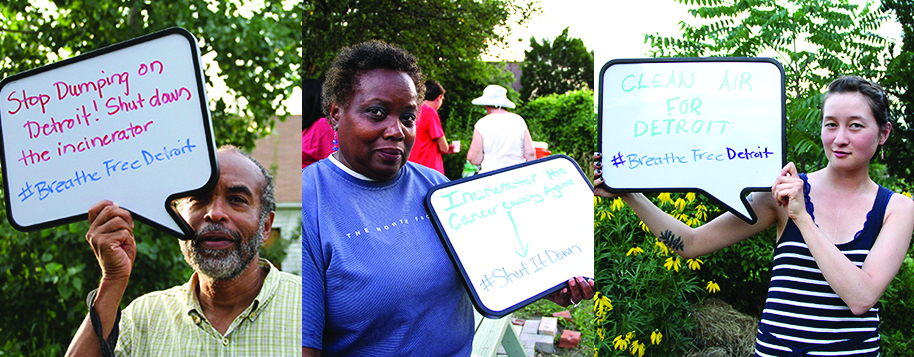UPDATE: After decades of community activism, it was announced on Wednesday, March 27th, 2019 that the Detroit Renewable Power Incinerator will be closed, effective immediately. This is a massive victory for the Breathe Free Detroit campaign and the neighbors living nearby this major source of air pollution.
Thank you for all of your support in this victory for environmental justice in Detroit. The Breathe Free Detroit campaign continues to pursue a just transition to zero waste, just transition for residents living near the facility, and a just transition for former incinerator workers.
Breathe Free Detroit is a community and grassroots-lead campaign fighting to shut down the Detroit incinerator. We work to engage the community, research the financial ties and the public health effects of the incinerator, and encourage decision-makers to stop the pollution of Detroit’s air.
The Facts:
WHAT IS AN INCINERATOR?
A facility that burns trash. The Detroit incinerator burns 3,300 tons of trash from homes, schools, hospitals, and businesses each day. What’s leftover is toxic ash that must be landfilled and emissions that pollute our air and contribute to climate change.
WHO OWNS THE INCINERATOR?
Detroit Renewable Power (DRP) has owned the incinerator since 2010. On November 30, 2017 Michigan Public Service Commission approved the sale of Detroit Thermal Power (including the incinerator) to Project Mist Holdco LLC of New York City. Sale is pending as of January 2018.
WHERE DOES THE TRASH COME FROM?
Trash burned at the Detroit incinerator comes from cities in ten Michigan counties (Wayne, Macomb, Monroe, Oakland, Washtenaw, Bay, Genesee, Ingham, Kent, and Livingston), Illinois, Ohio, and Canada.
WHAT DOES THE INCINERATOR COST THE CITY?
Detroit pays $25 per ton, approximately 66% more than other cities to send its trash to the incinerator. Pollution from the DRP facility costs $2.6 million in health costs each year.
HOW DOES THE INCINERATOR AFFECT OUR AIR?
DRP violated the federal Clean Air Act 446 times in 2015 and 2016. The violations include failure to monitor sulfur dioxide, carbon monoxide, and nitrous oxides, exceeding allowed limits of carbon monoxide emissions, and failure to effectively capture particulate matter.
HOW DOES THE INCINERATOR AFFECT OUR HEALTH?
A high respiratory hazard index in the area around the incinerator means it is one of the most dangerous places in the state to breathe. The incinerator is a health risk for a community that is already overburdened by air pollution.
- A Detroiter is 3x more likely to be admitted to the hospital for asthma than other Michigan residents. Children living near the incinerator are 5x more likely.
- Air pollutants released by the incinerator have been found to: cause and activate asthma, cause an increase in the use of asthma medication, and increase asthma-related hospitalizations for children.
- The Michigan Department of Community Health (now the Michigan Department of Health and Human Services) calls Detroit the “epicenter of asthma”
- Pollution from the Detroit incinerator can also cause: premature death, nonfatal heart attacks, irregular heartbeat, decreased lung function, coughing and difficulty breathing. Children, older adults, and those with heart or lung diseases are most likely to be affected.

WHO LIVES NEAR THE INCINERATOR?
76,681 children live within 5 miles of the incinerator. 87% of residents within one mile are persons of color; 60% live below the federal poverty line, with 20% unemployment.
WHAT ARE THE JUSTICE ISSUES ASSOCIATED WITH THE INCINERATOR?
A low-income community of color bears the environmental and public health burden of burning trash from wealthier (and whiter) communities in Michigan (including the Grosse Pointes and Oakland County) and beyond. The Detroit incinerator is a prime example of environmental racism.
WHAT ARE ALTERNATIVES TO INCINERATION?
Robust recycling programs and zero waste initiatives can greatly reduce the amount of trash produced. According to GAIA (Global Alliance for Incinerator Alternatives), most of what we now waste can be safely and economically recycled, reused, composted, or turned into biogas. We also need to simply use less disposable stuff and redesign our products so that they are toxic-free and built to last. Contact zerowastedetroit.org (313-986-2990) to sign up for a free recycling bin.
WHAT SHOULD RESIDENTS DO?
1. REPORT ODORS to MDEQ’s
Pollution Emerging Alert System hotline: 800-292-4706. Staff are available to receive calls 24/ 7.
Be prepared to provide: Name, Phone #, Address, Time of smell, Location of smell, Nature of smell (i.e. rotten eggs).
2. REPORT LOUD NOISES
coming from the facility to City of Detroit Ombudsman: (313) 224-6000 or City Clerk: (313) 224-3260
3. GET INVOLVED
Like us on Facebook, follow us on Twitter, attend one of our meetings!


